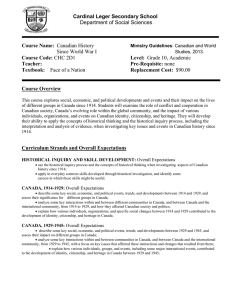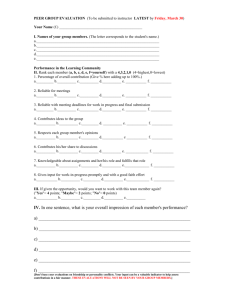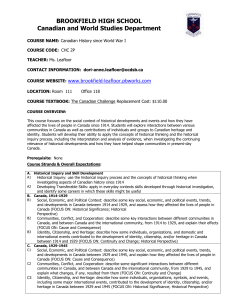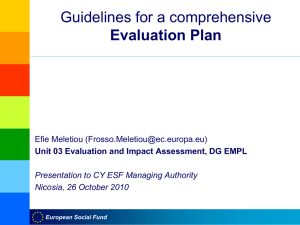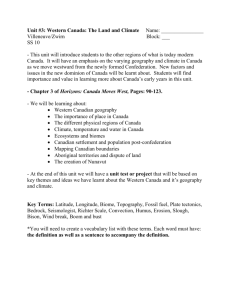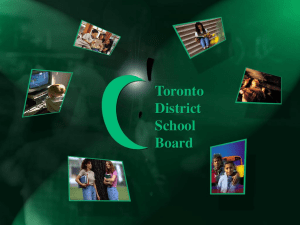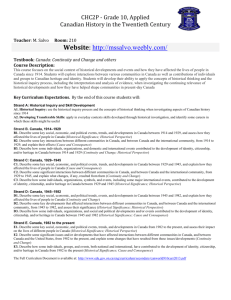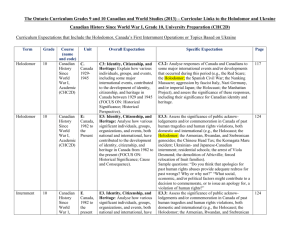File - Ms. Hibbert
advertisement
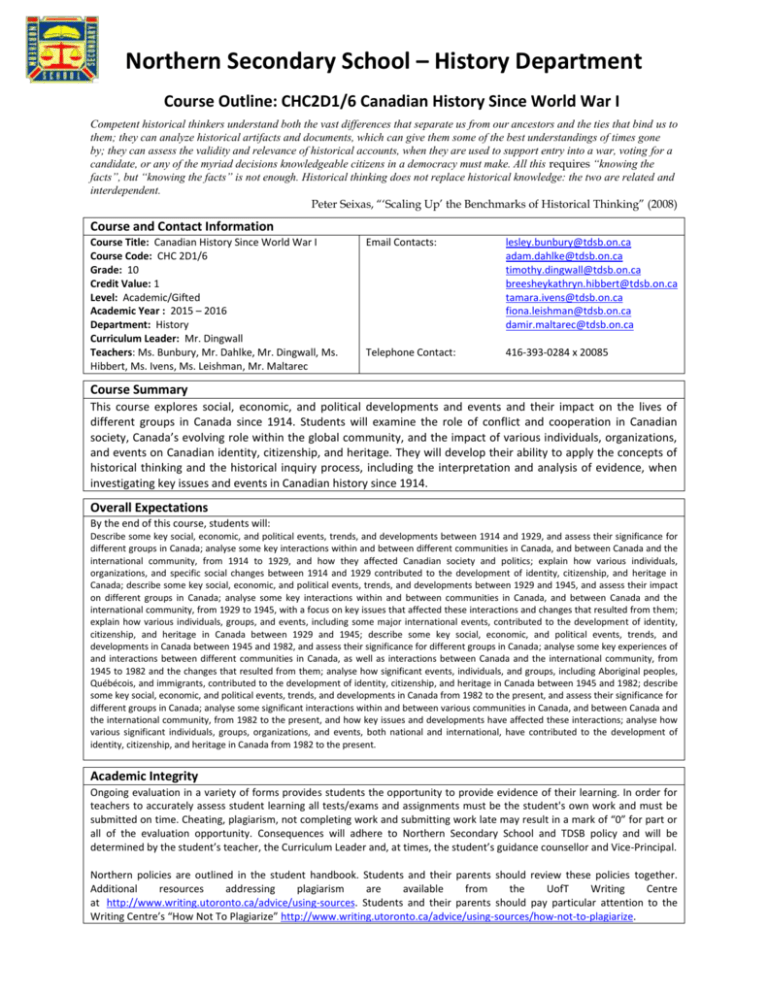
Northern Secondary School – History Department Course Outline: CHC2D1/6 Canadian History Since World War I Competent historical thinkers understand both the vast differences that separate us from our ancestors and the ties that bind us to them; they can analyze historical artifacts and documents, which can give them some of the best understandings of times gone by; they can assess the validity and relevance of historical accounts, when they are used to support entry into a war, voting for a candidate, or any of the myriad decisions knowledgeable citizens in a democracy must make. All this requires “knowing the facts”, but “knowing the facts” is not enough. Historical thinking does not replace historical knowledge: the two are related and interdependent. Peter Seixas, “‘Scaling Up’ the Benchmarks of Historical Thinking” (2008) Course and Contact Information Course Title: Canadian History Since World War I Course Code: CHC 2D1/6 Grade: 10 Credit Value: 1 Level: Academic/Gifted Academic Year : 2015 – 2016 Department: History Curriculum Leader: Mr. Dingwall Teachers: Ms. Bunbury, Mr. Dahlke, Mr. Dingwall, Ms. Hibbert, Ms. Ivens, Ms. Leishman, Mr. Maltarec Email Contacts: lesley.bunbury@tdsb.on.ca adam.dahlke@tdsb.on.ca timothy.dingwall@tdsb.on.ca breesheykathryn.hibbert@tdsb.on.ca tamara.ivens@tdsb.on.ca fiona.leishman@tdsb.on.ca damir.maltarec@tdsb.on.ca Telephone Contact: 416-393-0284 x 20085 Course Summary This course explores social, economic, and political developments and events and their impact on the lives of different groups in Canada since 1914. Students will examine the role of conflict and cooperation in Canadian society, Canada’s evolving role within the global community, and the impact of various individuals, organizations, and events on Canadian identity, citizenship, and heritage. They will develop their ability to apply the concepts of historical thinking and the historical inquiry process, including the interpretation and analysis of evidence, when investigating key issues and events in Canadian history since 1914. Overall Expectations By the end of this course, students will: Describe some key social, economic, and political events, trends, and developments between 1914 and 1929, and assess their significance for different groups in Canada; analyse some key interactions within and between different communities in Canada, and between Canada and the international community, from 1914 to 1929, and how they affected Canadian society and politics; explain how various individuals, organizations, and specific social changes between 1914 and 1929 contributed to the development of identity, citizenship, and heritage in Canada; describe some key social, economic, and political events, trends, and developments between 1929 and 1945, and assess their impact on different groups in Canada; analyse some key interactions within and between communities in Canada, and between Canada and the international community, from 1929 to 1945, with a focus on key issues that affected these interactions and changes that resulted from them; explain how various individuals, groups, and events, including some major international events, contributed to the development of identity, citizenship, and heritage in Canada between 1929 and 1945; describe some key social, economic, and political events, trends, and developments in Canada between 1945 and 1982, and assess their significance for different groups in Canada; analyse some key experiences of and interactions between different communities in Canada, as well as interactions between Canada and the international community, from 1945 to 1982 and the changes that resulted from them; analyse how significant events, individuals, and groups, including Aboriginal peoples, Québécois, and immigrants, contributed to the development of identity, citizenship, and heritage in Canada between 1945 and 1982; describe some key social, economic, and political events, trends, and developments in Canada from 1982 to the present, and assess their significance for different groups in Canada; analyse some significant interactions within and between various communities in Canada, and between Canada and the international community, from 1982 to the present, and how key issues and developments have affected these interactions; analyse how various significant individuals, groups, organizations, and events, both national and international, have contributed to the development of identity, citizenship, and heritage in Canada from 1982 to the present. Academic Integrity Ongoing evaluation in a variety of forms provides students the opportunity to provide evidence of their learning. In order for teachers to accurately assess student learning all tests/exams and assignments must be the student's own work and must be submitted on time. Cheating, plagiarism, not completing work and submitting work late may result in a mark of “0” for part or all of the evaluation opportunity. Consequences will adhere to Northern Secondary School and TDSB policy and will be determined by the student’s teacher, the Curriculum Leader and, at times, the student’s guidance counsellor and Vice-Principal. Northern policies are outlined in the student handbook. Students and their parents should review these policies together. Additional resources addressing plagiarism are available from the UofT Writing Centre at http://www.writing.utoronto.ca/advice/using-sources. Students and their parents should pay particular attention to the Writing Centre’s “How Not To Plagiarize” http://www.writing.utoronto.ca/advice/using-sources/how-not-to-plagiarize. Northern Secondary School – History Department Attendance and Punctuality Every class is an opportunity to think, learn and socialize. Every class missed is that opportunity lost. The consistent decision to skip, or arrive late to class, and forgo knowledge and betterment eventually becomes irrevocable. Though attendance is not worth marks, better attendance usually translates to better grades and a more complete individual. It is your responsibility to be in class and on time. Course Materials Texts: Replacement Cost to Student: Cruxton, J. Bradley. Spotlight Canada. 4th ed. Toronto: Oxford University Press, 2000. $69.26 Hoogeveen, Margaret. Creating Canada. Whitby: McGraw-Hill Ryerson, 2014. $74.95 Newman, Garfield. Canada – A Nation Unfolding. Ontario Edition. Toronto: McGraw-Hill $61.46 Ryerson Limited, 2000. Supplies: Three-ring binder, pen, pencil, internet and books for additional research. Some teachers may encourage the use of mobile devices in class. Unit Number Unit of Study Explanation Unit I Historical Inquiry and Skill Development 1914-1929: Trial by Fire – World War I and the Roaring Twenties 1929-1945: Courage and Triumph through Darkness – The Great Depression and World War II 1945-1982: Canada Post War – Conflict, Prosperity and Identity Students are briefly introduced to Historical Thinking Skills that will be employed to examine Canadian History throughout the course. The causes and conditions of War; injustice and protest - social, political, economic and technological evolution. Economic collapse and the rise of totalitarianism; Canada’s battlefield contributions, the Homefront and the Holocaust. Unit II Unit III Unit IV The Cold War and peacekeeping, the suburbs and consumerism, the Quiet Revolution and Separatism, the counter-culture, a Just Society, and a developing identity. Unit V 1982-the Present: Contemporary Rights, multiculturalism, regionalism, globalization and Canada – Justice, Unity and Diversity constitutional challenges, Canada on the World’s stage. Unit VI Final Summative Evaluation Applying Historical Thinking in an examination of Canadian History in the 20th and 21st Centuries. *Units and topics are subject to change. Every effort will be made to avoid any alteration. Evaluations Students will be evaluated through summative and final summative evaluations. Evaluations aim to be a valuable reflection, demonstration and assessment of classroom and independent learning. Term Evaluations Final Evaluations Term evaluations will comprise 70% of the final grade divided evenly through the achievement categories. Final evaluations will comprise 30% of the final grade divided evenly through the achievement categories. Achievement Categories Learning Skills Students will be evaluated through term summative evaluations and final summative evaluations in the following achievement categories used to arrive at a percentage grade on the Provincial Report Cards: Knowledge and Understanding (knowledge & understanding of content) 17.5% of final grade Thinking (use of planning skills, processing skills, & of critical/creative thinking processes) 17.5% of final grade Communication (expression and organization of ideas and information, communication for different and purposes, & the use of conventions, vocabulary, and terminology of the discipline in oral, visual, and/or written forms) 17.5% of final grade Application (application of knowledge and skills in familiar contexts, transfer of knowledge and skills to new contexts, & making connections within and between various contexts) 17.5% of final grade The Achievement Chart: Canadian and World Studies is can be found on pp. 3637 of Ontario Curriculum Grade 9 & 10: Canadian and World Studies available http://www.edu.gov.on.ca/eng/curriculum/secondary/canworld910curr2013.pdf Learning skills are reported on the Provincial Report Card separately from the percentage mark. They will indicate your demonstration of those skills required to be successful in history. These skills are grouped under the following headings: Responsibility (commitment, deadlines, timelines) Organization (planning, process) Independent Work (class time, homework, dedication) Collaboration (positive relationships, conflict resolution, sharing, teamwork) Initiative (opportunistic, innovative, positive attitude, hard-working) Self-Regulation (goal oriented, critical reflection, perseverance) Northern Secondary School – History Department
